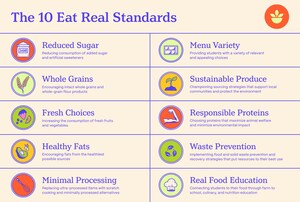
SAN FRANCISCO, Nov. 12, 2025 /PRNewswire/ -- Eat Real Certified announces a research partnership with Dr. Michael Goran, PhD, to study the impact of real food and nutritious options within schools and students' learning and development.
Some alarming statistics for today's youth:
- Thirty million kids in the U.S. rely on school food for over half of their daily calories
- 67% of their calories come from ultraprocessed foods
- Overall in the US 1 in 5 kids is considered obese, but this can be 1 in 3 in lower income neighborhoods**
- Kids today have an increased risk of type 2 diabetes, cardiovascular disease and fatty liver disease***
The partnership between Eat Real Certified and The Goran Lab will evaluate whether the high-quality, minimally processed school meals served in Eat Real Certified districts have a positive impact on student performance, starting with test scores. Eat Real's K-12 school food certification process gives Nutrition Services directors the framework, data, and support they need to make their menus more delicious, nutritious, and responsibly sourced. The research will compare Eat Real Certified districts in California against a similar cohort in the state.
"We care about children's health and are focused on the connection between nutrition and learning and development," said Nora LaTorre, CEO of Eat Real Certified. "We hope this research partnership is just the beginning of realizing the connection between nutrient-rich school foods and improved learning outcomes."
"The Eat Real program has huge potential to shift the way kids eat at schools and improve not only their future health risk but also their potential to do better at school. Rigorous evaluation of the Eat Real program is needed to demonstrate program efficacy on different outcomes." —Dr. Michael I Goran, PhD
This study was funded by The Southern California Center for Latino Health from the National Institute of Minority Health Disparities (NIMHD).
About Eat Real
Eat Real believes that school food is the key to creating impactful food systems change. U.S. school cafeterias serve over seven billion meals per year. By making those meals nutritious, delicious, and responsibly sourced, we can change the trajectory of our kids' health and curb the rise of diseases caused by overconsumption of ultraprocessed foods.
* Source: Tufts Daily
** Source: Robert Wood Johnson Foundation
*** Source: Harvard T.H. Chan School of Public Health
SOURCE Eat Real Certified, Inc








Share this article